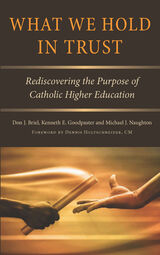
A comprehensive overview of the contribution of Catholic social thought to business ethics
Can a religion founded on loving one’s neighbor give moral approval to profit-seeking business firms in a global economy? What should characterize the relationship between faith and economic life? What can businesses, employees, and executives do to contribute to the common good and to make their practices and society more ethical?
Business Ethics and Catholic Social Thought provides a new and wide-ranging account of these two ostensibly divergent fields. Focusing on the agency of the business person and the interests of firms, this volume outlines fundamental issues confronting moral leaders and corporations committed to responsible business practices.
The book leads with interviews of three Catholic CEOs and the intellectual history of business ethics in Christianity before examining fundamental moral concerns regarding business: its purpose, autonomy, practical wisdom, and the technocratic paradigm. Contributing authors also consider management science, the motivations of business leaders, the role of luck in personal success, the traditional moral justifications for business, and more. These contributions bring new depth to the application of Catholic social thought to business ethics during a time when economic crisis demands a reevaluation of business and its contribution to society.

READERS
Browse our collection.
PUBLISHERS
See BiblioVault's publisher services.
STUDENT SERVICES
Files for college accessibility offices.
UChicago Accessibility Resources
home | accessibility | search | about | contact us
BiblioVault ® 2001 - 2024
The University of Chicago Press









